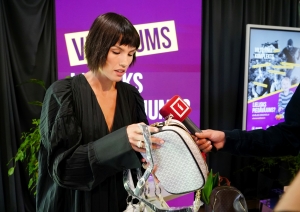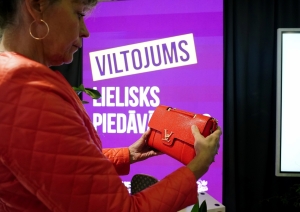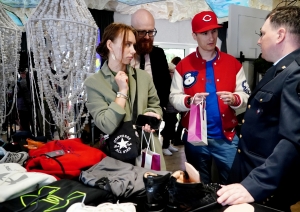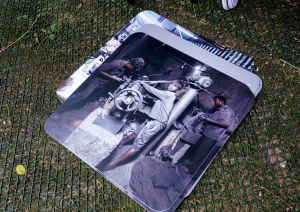On Wednesday, 12 June, celebrating World Anti-Counterfeiting Day, the Latvian Patent Office (LPO) together with the National Customs Board of the State Revenue Service (the National Customs Board) and the Minister of Justice, launched the “Counterfeit - a great kit?” awareness campaign, highlighting the “dark side” of counterfeiting - forced labour of children, inhuman working conditions, crime financing, health, and other risks.
The visitors could view the displayed counterfeits, check their own knowledge of the signs that indicate a counterfeit, and also play a large-format memory game to see what the counterfeit’s “kit” consists of.
The counterfeit goods were displayed in categories, so that everyone could explore the “kits of interest”, while Egīls Misītis, a Senior Customs Expert at the National Customs Board, told the visitors about the signs that help distinguish counterfeits in each of the categories and the negative effects of fakes.
"Do we want to a healthy economy, legal labour relations, and the opportunity for people to work in a safe environment? We have the chance to think about such things on World Anti-Counterfeiting Day, which we have been celebrating for 25 years. We must ensure that our legal system does everything in its power to stop this organized crime. Counterfeits cause more than 120 billion euros of losses to the economy of the European Union, and therefore to us. This money is lost for many areas that are important to us - safety, health, education, and others. That is why buying fakes is not as innocent an activity as it might seem - it means participating in criminal schemes," said Minister of Justice Inese Lībiņa-Egnere, addressing the audience at the opening of the campaign.
She also invited those who use to buy counterfeits to think and stop it and to join efforts to recover the economy.
The estimates by the Corsearch international research and analytics company reveal that the global counterfeit trade could reach around €1.7 trillion (£1.43 trillion) by 2030. This would be 75% more than in 2023.
“We should have no illusions that a counterfeit handbag, helmet, toy, or smartwatch is just a cheaper purchase. The counterfeiting business finances criminal activities - money laundering, illegal trade in drugs and arms, and, after all, terrorism, not to mention the impact on health, and environmental consequences. If we think more broadly – perhaps, we can save a few hundred euros now, but this is a boomerang that will come back. For example, piles of waste will not be recycled, they will remain in the natural environment, and the public will need to pay extra to prevent this pollution," pointed out LPO Director Agris Batalauskis.
World Anti-Counterfeiting Day has been celebrated every June since 1999. Every year, the LPO together with the cooperation partners marks this event. This year, there is a special emphasis on sustainability and the negative consequences of extensive counterfeiting business.
“The LPO supports the United Nations’ sustainable development goals, which include poverty eradication, responsible consumption and production, decent work and economic growth, good health and well-being, and more. I believe it is clear how these goals relate to combating the “counterfeiting economy”. Each of us can as a consumer act responsibly and buy original goods, thus supporting honest entrepreneurs who pay taxes, invest in the growth and well-being of their employees, and in innovations," added Agris Batalauskis.
In 2023, the National Customs Board detected 230 consignments of counterfeit goods, including 220 ones by post or courier. The most popular categories of counterfeit goods were toys, perfumes, clothing, and stickers. Other categories included footwear, bags, jewelry, and medicines. Among counterfeit clothes and shoes, exclusive brand goods were detected most often.
“Every day we meet people who ask, “Why can’t I buy fake goods? They are just for my personal use.” The explanation is simple - such goods come “complete” with a lot of risks, including health and safety risks for the buyers themselves, because people who purchase counterfeit perfumes or clothes do not realize that they may be made from low-quality raw materials and cause harm to their own and their children's health. Last year, we detained more than 230 thousand counterfeit goods. In most cases, counterfeits were detected in postal items, and this shows buyers’ high tolerance for fakes and the lack of understanding of the damage they cause to society as a whole," stressed Deputy Director of the National Customs Board Sandra Kārkliņa-Ādmine.
According to the European Union Intellectual Property Office’s (EUIPO) data, the European clothing industry suffers the most from manufacturers of counterfeit goods, losing almost 12 billion euros a year, or 5.2% of sales. Based on data for 2018-2021, the EUIPO found that manufacturers of legitimate clothes, shoes, cosmetics, and toys suffered annual losses of more than 16 billion euros.








